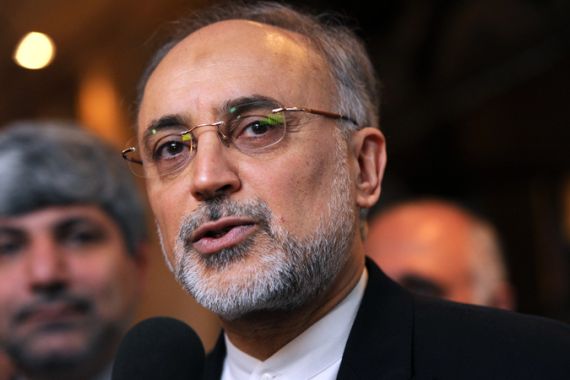Iran says Assad ‘will take part’ in 2014 vote
Foreign Minister Ali Akbar Salehi also says President Bashar al-Assad has “no choice” but to keep fighting rebels.

President Bashar al-Assad will take part in Syria’s next presidential election in 2014, the foreign minister of close Damascus ally Iran has said.
“In the next election, President Assad, like others, will take part, and the Syrian people will elect whomever they want,” Ali Akbar Salehi said at a news conference on Saturday with his visiting Syrian counterpart, Walid al-Muallem.
“The official position of Iran is that… Assad will remain legitimate president until the next… election” in 2014, Salehi said.
Muallem arrived on Saturday for talks aimed at ending the nearly two-year conflict in Syria that the United Nations says has killed at least 70,000 people and is tearing the country apart.
His visit comes after a week of intense international diplomacy aimed at ending the bloodshed.
Salehi threw Iran’s weight behind Damascus’s call this week for dialogue with the armed opposition, calling the initiative a “positive step”, but reiterated Assad’s government has “no choice” but to keep fighting rebels.
“We believe that the crisis has no military solution and only a Syrian political one,” said the Iranian minister.
“Iran firstly wants stop to the bloodshed but the Syrian government has no choice but to fight against the terrorists and we cannot ask the Syrian government not to do so and leave them alone,” he added.
Muallem condemned the announcement by John Kerry, the US secretary of state, on Thursday that Washington would provide $60m in “non-lethal” assistance to support the Syrian political opposition.
“When the US [says it has] allocated $60m to the opposition and this opposition is killing people, I don’t understand this initiative… are there any weapons that do not kill people? Who are you kidding?” Muallem asked.
He repeated calls for pressure to be exerted on Turkey and Qatar, among the main supporters of the rebels alongside Western countries.
While in Tehran, Muallem is also due to meet Saeed Jalili, the secretary of the Supreme National Security Council, the Mehr news agency reported.
‘Political transition’
Assad himself spoke out in a rare interview with the UK-based Sunday Times, portions of which were broadcast on British television on Saturday. The Syrian president called Britain’s involvement in the crisis naive and unrealistic.
“I think they [Britain] are working against us, and they are working against the interests of the UK itself,” he said. “This government is acting in a naive, confused and unrealistic manner. If they want to play a role they have to change this, they have to act in a more reasonable and responsible way.”
Assad added: “How can you ask them to play a role in making the situation better, more stable, how can we expect them to make the violence less when they want to send the military supply to the terrorist?”
Meanwhile, on Friday, the US president and his Russian counterpart expressed agreement in a telephone call on “the need to advance a political transition” and seek “new initiatives” to end the violence in Syria as soon as possible, the White House has said.
Barack Obama and Vladimir Putin welcomed “substantive and constructive consultations” by Kerry and Russian Foreign Minister Sergei Lavrov over a political transition in Syria, the White House said in a statement.
The statement did not elaborate further on Friday’s discussion between the two leaders on the Syria conflict.
Moscow and Washington have long been at odds over the fate of Assad.
The US says he must go, but Russia says his exit from power must not be a precondition for a negotiated settlement.
Obama and Putin also agreed to hold bilateral talks at the Group of Eight summit in Northern Ireland in June.
The US president also welcomed Russia’s co-operation on international efforts to confront Iran’s nuclear ambitions.